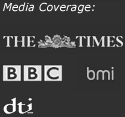With a normal bank loan, banks will provide financial support through either a loan or an overdraft but will require that the business can demonstrate some form of security against defaulting on its loan payments, often called collateral.
However the government has provided a way of getting a bank loan without this form of security for small businesses. In the UK it used to be called the Small Firms Loan Guarantee scheme (SFLG), which now has been replaced by the Enterprise Finance Guarantee (EFG). The interest rate is normally not a preferential one and can be slightly more. To qualify you should be able to show that you have a good business plan and meet the relevant eligibility criteria (ask your participating bank contact - see below).
The SFLG and now the EFG is a joint venture between the government and several high street banks.
The government will guarantee 75% of the loan, easing the need for secure collateral. Ideal if you have a good business plan but little assets. Note that it is still a loan - not a grant. The cost of the guarantee is an additional 2% per year on the outstanding loan amount, paid to the DTI on top of whatever loan rate the bank is charging.
The EFG is available to guarantee loans between £1000 and £1.2m and with terms of up to ten years for qualifying UK businesses with an annual turnover of up to £41m.
To get started, have a look to make sure you are eligible, get your business plan together (there is other free advice on business plans elsewhere in the Company Partners blog) and approach a participating bank to ask if you can obtain a EFG loan application.
Further information: Understanding the Enterprise Finance Guarantee



